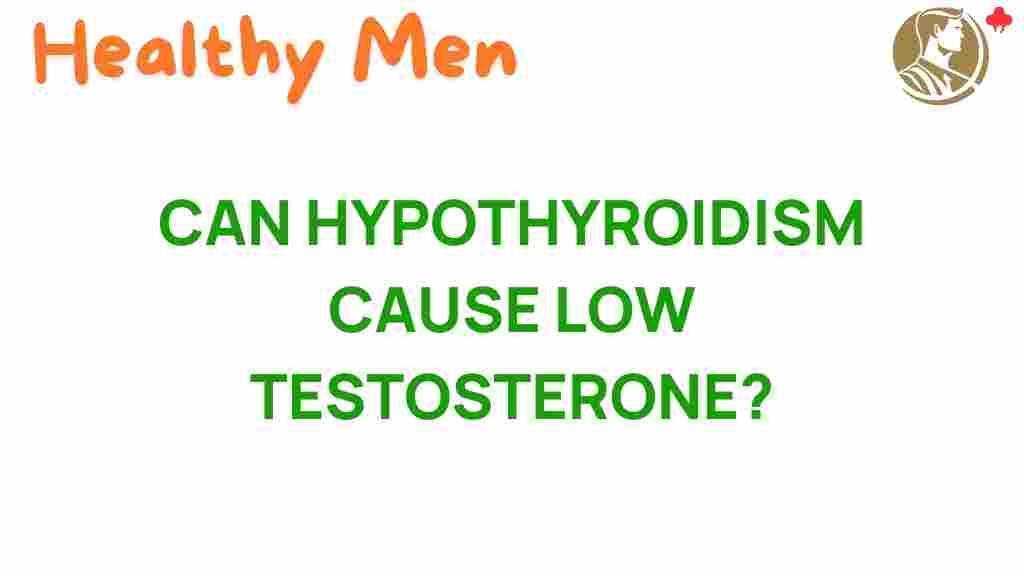Unveiling the Connection: Can Hypothyroidism Lead to Low Testosterone?
Hypothyroidism and low testosterone are two significant health issues that can severely impact men’s health. While they may seem unrelated at first glance, emerging research suggests a strong connection between thyroid function and testosterone levels. In this article, we will delve into the relationship between hypothyroidism and low testosterone, exploring the underlying mechanisms, symptoms, treatments, and how to maintain a healthy endocrine system.
Understanding Hypothyroidism
Hypothyroidism is a condition characterized by an underactive thyroid gland, which fails to produce enough thyroid hormones. These hormones are crucial for regulating metabolism, energy levels, and overall health. Common causes of hypothyroidism include:
- Autoimmune diseases (e.g., Hashimoto’s thyroiditis)
- Thyroid surgery
- Radiation therapy
- Certain medications
- Iodine deficiency
Symptoms of hypothyroidism can vary widely but often include:
- Fatigue and weakness
- Weight gain
- Cold intolerance
- Depression
- Dry skin and hair
- Constipation
The Role of Testosterone in Men’s Health
Testosterone is the primary male sex hormone and is vital for various bodily functions. It plays a critical role in:
- Maintaining muscle mass and strength
- Regulating fat distribution
- Enhancing libido and sexual function
- Supporting mood and cognitive functions
Low testosterone, or hypogonadism, can lead to numerous health concerns, including:
- Reduced energy and fatigue
- Decreased libido and sexual dysfunction
- Loss of muscle mass
- Increased body fat
- Depression and irritability
The Link Between Hypothyroidism and Low Testosterone
Research indicates that there is a significant connection between hypothyroidism and low testosterone levels. The thyroid and testes are both part of the endocrine system, and their functions are intertwined. When thyroid function is compromised, it can lead to hormonal imbalances that affect testosterone production. Here’s how:
1. Hormonal Regulation
The thyroid hormones, primarily thyroxine (T4) and triiodothyronine (T3), play a crucial role in the regulation of sex hormones, including testosterone. Low levels of these hormones can disrupt the hypothalamic-pituitary-gonadal (HPG) axis, leading to decreased testosterone production.
2. Impact on Luteinizing Hormone (LH)
Hypothyroidism can lead to altered levels of luteinizing hormone (LH), which is essential for stimulating testosterone production in the testes. Low LH levels can result in decreased testosterone synthesis, contributing to low testosterone symptoms.
3. Effects on Estrogen Levels
Hypothyroidism can also impact estrogen levels in men. Elevated estrogen levels can inhibit testosterone production, further exacerbating low testosterone symptoms.
Symptoms of Low Testosterone in Hypothyroid Patients
Men suffering from both hypothyroidism and low testosterone may experience a range of symptoms, including:
- Persistent fatigue
- Decreased libido
- Difficulty concentrating
- Reduced muscle mass and strength
- Increased body fat, particularly around the abdomen
Diagnosis and Testing
If you suspect that hypothyroidism may be affecting your testosterone levels, it’s essential to seek medical advice. Diagnosis typically involves:
- Blood Tests: Measuring levels of TSH (Thyroid Stimulating Hormone), T3, T4, and testosterone to evaluate thyroid function and testosterone levels.
- Symptom Review: Discussing symptoms with a healthcare provider to understand their impact on health.
Treatment Options for Hypothyroidism and Low Testosterone
Treating hypothyroidism and low testosterone typically involves a two-pronged approach:
1. Addressing Hypothyroidism
The primary treatment for hypothyroidism is hormone replacement therapy, which usually involves:
- Levothyroxine: A synthetic form of T4 that restores normal thyroid hormone levels.
Regular monitoring of thyroid hormone levels is crucial to ensure the correct dosage and optimal thyroid function.
2. Managing Low Testosterone
Low testosterone can be treated through various methods, including:
- Testosterone Replacement Therapy (TRT): Administering testosterone through injections, patches, gels, or pellets.
- Lifestyle Changes: Improving diet, increasing physical activity, and reducing stress can positively influence testosterone levels.
Step-by-Step Process for Managing Both Conditions
Managing hypothyroidism and low testosterone can be a step-by-step process:
- Consultation: Schedule an appointment with an endocrinologist or healthcare provider.
- Blood Testing: Get blood tests to evaluate thyroid and testosterone levels.
- Diagnosis: Discuss results and symptoms with your healthcare provider.
- Treatment Plan: Develop a personalized treatment plan that may include hormone replacement therapy and lifestyle modifications.
- Regular Monitoring: Keep regular follow-up appointments to monitor hormone levels and adjust treatment as necessary.
Troubleshooting Common Issues
While managing hypothyroidism and low testosterone, you may encounter some common issues:
1. Inadequate Symptom Relief
If you don’t feel better after starting treatment, consult your healthcare provider. They may need to adjust your medication dosage or explore other treatment options.
2. Side Effects from Hormone Replacement Therapy
Some patients experience side effects from TRT, such as acne, mood changes, or increased red blood cell count. Discuss these with your doctor for appropriate management.
3. Lifestyle Factors
Your lifestyle can significantly impact hormone levels. Ensure you are maintaining a healthy diet, regular exercise routine, and managing stress levels.
Conclusion
Understanding the connection between hypothyroidism and low testosterone is crucial for men’s health. If you are experiencing symptoms of either condition, it is vital to seek medical attention. Early diagnosis and appropriate treatment can lead to significant improvements in quality of life. Remember that both conditions can significantly affect each other, and addressing them holistically is essential for optimal health.
For more information on hormonal health, visit Men’s Health Network. If you’re looking for support or want to learn more about managing these conditions, check out Thyroid Foundation.
Take control of your health today and ensure your endocrine system functions optimally!
This article is in the category Conditions and created by healthymen Team
